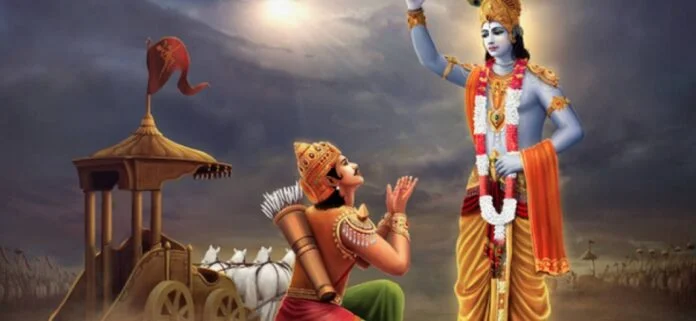श्लोक 20 – Verse 20
प्रकृतिं पुरुषं चैव विद्ध्यनादी उभावपि।विकारांश्च गुणांश्चैव विद्धि प्रकृतिसंभवान्।।13.20।।
prakṛitiṁ puruṣhaṁ chaiva viddhy anādī ubhāv api
vikārānśh cha guṇānśh chaiva viddhi prakṛiti-sambhavān
शब्दों का अर्थ
prakṛitim—material nature; puruṣham—the individual souls; cha—and; eva—indeed; viddhi—know; anādī—beginningless; ubhau—both; api—and; vikārān—transformations (of the body); cha—also; guṇān—the three modes of nature; cha—and; eva—indeed; viddhi—know; prakṛiti—material energy; sambhavān—produced by
Translations by Teachers (आचार्यो द्वारा अनुवाद):
Swami Ramsukhdas (Hindi)
।।13.20।।प्रकृति और पुरुष — दोनोंको ही तुम अनादि समझो और विकारों तथा गुणोंको भी प्रकृतिसे ही उत्पन्न समझो। कार्य और करणके द्वारा होनेवाली क्रियाओंको उत्पन्न करनेमें प्रकृति हेतु कही जाती है और सुख-दुःखोंके भोक्तापनमें पुरुष हेतु कहा जाता है।
Swami Tejomayananda (Hindi)
।।13.20।। प्रकृति और पुरुष इन दोनों को ही तुम अनादि जानो। और तुम यह भी जानो कि सभी विकार और गुण प्रकृति से ही उत्पन्न हुए हैं।।
Swami Adidevananda (English)
Know that both Prakṛti and the Self (Puruṣa) are without beginning; know that all modifications and the attributes are born from Prakṛti.
Swami Gambirananda (English)
Know both Nature and the individual soul to be verily without beginning; know the modifications as well as the qualities to be born of Nature.
Swami Sivananda (English)
Know that Nature (matter) and the Spirit are both beginningless, and know also that all modifications and qualities are born from Nature.
Dr. S. Sankaranarayan (English)
Both the Material Cause and the Soul are beginningless; you should know this. You should also know that the modifications and strands are born from the Material Cause.
Shri Purohit Swami (English)
Know further that Nature and God have no beginning, and that differences in character and quality originate from Nature only.
